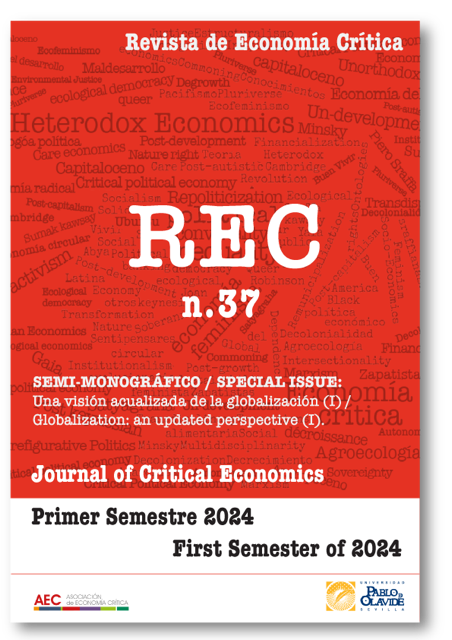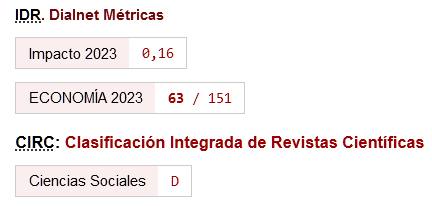Efectos y desafíos de la automatización y la digitalización. Parte I, actualización
DOI:
https://doi.org/10.46661/rec.10698Palabras clave:
digitalización, automatización, revolución industrial, Industria 4.0, trabajo empleo y organización del trabajoResumen
En esta contribución se hace referencia a los retos que, la automatización y la digitalización están teniendo sobre el empleo y sobre otros aspectos. Para ello, se basa en los resultados de trabajos ya publicados que se intentan actualizar, puesto que no dejan de aparecer nuevas investigaciones, y bibliografía “gris”. En nuestra opinión, tras el análisis de la información disponible, los dos cambios principales que han tenido lugar desde el último tercio del siglo pasado, que están afectando profundamente al empleo y a las condiciones de trabajo, son la creciente desigualdad en la distribución de la renta y la riqueza, así como el impacto del cambio en el paradigma tecno-económico ligado a la automatización y la digitalización. La intención es continuar el debate sobre estos cambios.
Descargas
Citas
Acemoglu, Daron.; Lelarge, Claire; Restrepo, Pascual (2020): "Competing with robots: Firm-level evidence from France," American Economic Association, Papers, and Proceedings. Vol. 110, May 2020. 383-88. https://doi.org/10.1257/pandp.20201003
Aghion, Philippe; Antonin, Céline; Bunel, Simon (2019): "Artificial Intelligence, Growth and Employment: The Role of Policy". Economie et Statistique / Economics and Statistics, Nº. 510-511-512. 149-164. https://doi.org/10.24187/ecostat.2019.510t.1994
Aghion, Phillipe; Antonin, Céline; Bunel, Simon; Jaravel, Xaxier (2021): What Are the Labor and Product Market Effects of Automation? New Evidence from France. https://scholar.harvard.edu/aghion/publications/what-are-labor-and-product-market-effects-automation-new-evidence-france.
Aghion, Philippe; Antonin, Céline; Jaravel, Xavier (2022): DP16868 The Effects of Automation on Labor Demand: A Survey of the Recent Literature. CEPR Press Discussion Paper No. 16868. https://cepr.org/publications/dp16868. January.
Albanesi, Stefania.; Dias, António; Jimeno, Juan F.; Lamo, Ana; Wabitsch, Alena (2023): New technologies and Jobs in Europe. IZA Institute of Labor Economics. Discussion Paper Series. Nº 16227. June. https://doi.org/10.53479/33414
Anton, José Ignacio; Klenert, David; Fernández, Enrique.; Urzì, Maria Cesira; Alaveras, Georgios (2022): "The labour market impact of robotisation in Europe". European Journal of Industrial Relations. 2022. Online. https://doi.org/10.1177/09596801211070801
Apella, Ignacio.; and Zunino, Gonzalo (2022): "El cambio tecnológico y las tendencias del mercado laboral en América Latina y el Caribe: un análisis basado en las tareas". Revista de la CEPAL. N. º 136, abril. 65-88. https://doi.org/10.18356/16820908-2022-136-4
Autor, David; Salomons, Anna (2018): Is automation labor-displacing? Productivity growth, employment and the labor share. National Bureau of Economic Research. Working Paper 24871. July. https://doi.org/10.3386/w24871
Autor, David; Mindell, David; Reynolds, Elisabeth (2020): The Work of the Future: Building Better Jobs in an Age of Intelligent Machines. Cambridge, MIT Work of the Future.
Bajgar, Matej, Berlingieri, Giuseppe, Calligaris, Sara, Criscuolo, Chiara; and Timmis, Jonathan (2019) Industry Concentration in Europe and North America. OECD Productivity Working Papers, 2019-18, OECD Publishing, Paris. To be published at Industrial and Corporate Change. January 2013.
Ballestar, Mª. Teresa; García-Lázaro, Aida; Sainz, Jorge (2020): "Todos los caminos llevan a la educación: Un primer análisis de la robotización, la educación y el empleo". Papeles de Economía Española. Nº 166. 4º trimestre. 33-49.
Balsmeier, Benjamin; Woerter, Martin (2019): "Is this time different? How digitalization influences job creation and destruction." Research Policy. V48-i8-october. https://doi.org/10.1016/j.respol.2019.03.010
Bassanini, Andrea et al. (2022): Labour Market Concentration, Wages and Job Security in Europe. FEDEA. Documento de Trabajo 2022/04, abril. https://doi.org/10.2139/ssrn.4114807
Bertani, Filippo; Raberto, Marco; Teglio, Andrea (2020): "The productivity and unemployment effects of the digital transformation: an empirical and modelling assessment". Review of Evolutionary Political Economy. Vol. 1, Issue 3, November. 329-355. https://doi.org/10.1007/s43253-020-00022-3
Bessen, James; Goos, Maarten; Salomons, Anna; van den Berge, Wiljan (2020): "Firm-level automation: Evidence from the Netherlands". American Economic Association, Papers, and Proceedings. Vol. 110, May. 389-393. https://doi.org/10.1257/pandp.20201004
Bessen, James (2020): "Industry Concentration and Information Technology". Journal of Law and Economics. Vol. 6, n3, August. 531-555. https://doi.org/10.1086/708936
Bonfiglioli, Alessandra; Crinó, Rosario; Fadinger, Harald; Gancia, Gino (2020): Robot imports and firm-level outcomes. CesIfo Working Papers, 8741, December. https://doi.org/10.2139/ssrn.3744604
Braña Pino, Francisco Javier (2019): "A fourth industrial revolution? Digital transformation, labor and work organization: a view from Spain." Journal of Industrial and Business Economics. Vol. 46, nº 3. September. 415-430. https://doi.org/10.1007/s40812-019-00122-0
Braña Pino, Francisco Javier (2020): Cuarta revolución industrial, automatización y digitalización: una visión desde la periferia de la Unión Europea en tiempos de pandemia. ICEI WP04-2020. https://eprints.ucm.es/61648/.
Breemersch, Koen; Damijan, Joze P.; Konings, Jozef (2019): "What drives labor market polarization in advanced countries? The role of China and technology." Industrial ald Corporate Change. Vol. 28 nº 1. 51-77. https://doi.org/10.1093/icc/dty063
Brekelmans, Sybrand; Petropoulos, Georgios (2020): Occupational change, artificial intelligence and the geography of EU labour markets. Working Paper 03/2020, June. Bruegel.
Broecke, Stijn; Lane, Marguerita; Williams, Morgan (2023): The impact of AI on the workplace: Main finding from the OECD AI surveys of employers and workers. OECD Social, Employment and Migration Working Papers, nº 288. DELSA/ELSA/WD/SEM (2023)6.
CEDEFOP (2018): Skills forecast, trends and challenges to 2030. Luxembourg.
Caravella, Serenella.; Cirillo, Valeria; Crespi, Francesco; Guarascio, Dario; Menghini, Mirko (2023): "The diffusion of digital skills across EU regions: structural drivers and polarisation dynamics". Regional Studies, Regional Science. Vol. 10, n1. 820-844. https://doi.org/10.1080/21681376.2023.2265498
Cirillo, Valeria; Rinaldo, Evangelista; Guarascio, Dario; Sostero, Matteo (2021): "Digitalization, routineness and employment: An exploration on Italian task-based data". Research Policy. V50n7-september. https://doi.org/10.1016/j.respol.2020.104079
Da^gli, Ìbrahim (2021): "Will Workers be Unemployed Because of Robots? A Meta-Analysis on Technology and employment." Sosyoekonomi. Vol. 29 (50), 485-501. https://doi.org/10.17233/sosyoekonomi.2021.04.22
Dixon, Jay (2020): The employment consequences of Robots: Firm-level Evidence. Statistics Canada. Analytical Studies Branch Research Paper Series. November 2. https://doi.org/10.2139/ssrn.3422581
Domini, Giacomo; Grazzi, Marco; Moschella, Daniele; Treibich, Tania (2021): "Threats and opportunities in the digital era: Automation spikes and employment dynamics. Research Policy. Vol.50.i7 - September. https://doi.org/10.1016/j.respol.2020.104137
Dosi, Giovanni (1984): Technical change and industrial transformation. Palgrave Mac Millan, London.Dosi, Giovanni; Freeman, Chistopher.; Nelson, Richard; Silvergberg, Gerard and Soete, Luc (Editores) (1988): Technical change and Economic Theory. Pinter, London.
Dosi, G.; Piva, M.; Virgillito, M.E.; Vivarelli, M. (2021): "Embodied and disembodied technological change: The sectoral patterns of job-creation and job-destruction". Research Policy. V50n4, May. https://doi.org/10.1016/j.respol.2021.104199
Ernst, Ekkehardt; Merola, Rossna; Samaan, Daniel (2019): "Economics of Artificial Intelligence: Implications for the Future of Work". IZA Journal of Labor Policy. V9n4. https://doi.org/10.2478/izajolp-2019-0004
Eurofound (2019): The future of manufacturing in Europe. Publications Office of the European Union, Luxembourg.
Felten, Edward; Raj, Manav; Seamans, Robert (2019): The Occupational Impact of Artificial Intelligence on Labor: The Role of Complementary Skills and Technologies. NYU Stern School of Business, http://dx.doi.org/10.2139/ssrn.3368605.
Filippi, Emilia; Bannó, Mariasole; Trento, Sandro (2023): "Automation technologies and their impact on employment: A review, synthesis and future research agenda". Technological Forecasting & Social Change.191, June, 122448. https://doi.org/10.1016/j.techfore.2023.122448
Firooz, Hamid; Liu, Zheng; Wang, Yajie (2022): Automation, Market Concentration, and the Labor Share. SSRN: https://ssrn.com/abstract=4040235 or http://dx.doi.org/10.2139/ssrn.4040235. April 5.
Freeman, Christopher. (1974): The Economics of Industrial Innovation. Penguin Books, Harmondsworth.
Frey, Carl B.; Osborne, Michael (2017): "The Future of Employment: How Susceptible Are Jobs to Computerization?". Technological Forecasting and Social Change n11, January. 254-280. https://doi.org/10.1016/j.techfore.2016.08.019
Georgieff, Alexandre.; Milanez, Anna (2021): What happened to jobs at high risk of automation? OECD. Directorate for employment, labour and social affairs employment, labour and social affairs committee. DELSA/ELSA/WD/SEM (2021) 2. May.
Gmyrek, Pawe.; Berg, Janine; Bescond, David (2023): Generative AI and jobs: A global analysis of potential effects on job quantity and quality. International Labour Organization. ILO Working Papers, 96. August. https://doi.org/10.54394/FHEM8239
Green, Andrew (2019): What is happening to the middle skill workers? OECD Social, Employment and Migration Working Papers No. 230, May. DELSA/ELSA/WD/SEM (2019)9.
Green, Andrew (2023): "Artificial intelligence and jobs: No signs of slowing labour demand (yet)". OECD Employment Outlook 2023. OECD Publishing, Paris. 102-127. https://doi.org/10.1787/9c86de40-en
Goos, Maarten (2018): "The impact of technological progress on labour markets: policy challenges". Oxford Review of Economic Policy, Volume 34, Number 3, Autum. 362-375. https://doi.org/10.1093/oxrep/gry002
Grigoli, Francesco; Koczan, Zsoka; Topalova, Petia (2020): "Automation and labor force participation in advanced economies: Macro and micro evidence". European Economic Review. Nº 126, July. 1-23. https://doi.org/10.1016/j.euroecorev.2020.103443
Grybauskas, Andrius; Stefanini, Alessandro; Ghobakhloo, Morteza (2022): "Social sustainability in the age of digitalization: A systematic literature review on the social implications of Industry 4.0". Technology in Society. V.70, August. https://doi.org/10.1016/j.techsoc.2022.101997.
Guarascio, Dario.; Piccirillo, Alessandro; Reljic, Jelena (2024): Will robot replace workers? Assessing the impact of robots on employment and wages with meta-analysis. LEW Working Papers Series 2024/03. Institute of Economics. Scuola Superiore Sant'Anna. February. https://doi.org/10.2139/ssrn.4750618
Humlum, Anders (2021): Robot Adoption and Labor Market Dynamics. The Rockwool Found/ation. Study Paper 175. Copenhagen, May 2022.
Jurkat, Anne; Klump, Rainer; Schneider, Florian (2023): Robots and Wages: A Meta-Analysis. ZWU - Leibniz Information Centre for Economics. Kiel, Hamburg. July.
Katz, Raul; Callorda, Fernando; and Jung, Juan (2021): "The impact of automation on employment and its social implications: evidence from Chile". Economics of Innovation and New Technology. On line 4 november. https://doi.org/10.1080/10438599.2021.1991798.
Knell, Mark (2021): "The digital revolution and digitalized network society". Review of Evolutionary Political Economy. V.2, Nº 1, April. 9-25. https://doi.org/10.1007/s43253-021-00037-4
Koltay, Gábor.; Lorincz, Szabolcs (2021): Industry concentration and competition policy. European Commission. Competition Policy Brief, issue 2021/02, November. https://doi.org/10.2139/ssrn.3992591
Kwon, Spencer; Ma, Yueran; Zimmermann, Kaspar (2023): 100 Years of Rising Corporate Concentration. businnesconcentration.com. Last accessed February 25, 2023. https://doi.org/10.2139/ssrn.4362319
Lane, Marguerita; Saint-Martin, Anne (2021): The impact of Artificial Intelligence on the labour market: What do we know so far? OECD Social, Employment and Migration Working Papers. Nº 256. DELSA/ELSA/WD/SEM (2021)3.
Lassébie, Julie (2023): "Skill needs and policies in the age of artificial intelligence". OECD Employment Outlook 2023. OECD Publishing, Paris. 155-181. https://doi.org/10.1787/638df49a-en
Longmuir, Maximilian; Schröder, Carsten; Targa, Matteo (2020): De-routinization of Jobs and Polarization of Earnings - Evidence from 35 Countries. Luxemburg Income Study. Working Paper 76 - June.
Mann, Katja and Püttmann, Lukas (2018): Benign Effects of Automation: New Evidence from Patent Texts(August 15, 2018). Available at SSRN: https://ssrn.com/abstract=2959584 or http://dx.doi.org/10.2139/ssrn.2959584
Martín, José Moisés; Rodríguez, María Luz; Suso, Anabel (2020): Políticas públicas, sociales y fiscales para las sociedades digitales. Fundación Alternativas. Laboratorio, Documento nº 204-2020. 30 de junio de 2020.
Martins-Neto, Antonio; Mathew, Nanditha; Mohnen, Pierre; Tribich, Tania (2021): Is There Job Polarization in Developing Economies? A Review and Outlook. CesIfo Working Papers, 9444, November. https://doi.org/10.2139/ssrn.3979349
Montobbio, Fabio; Staccioli, Jacopo; Virgillito, Maria E.; Vivarelli, Marco (2023): "The empirics of technology and occupations: Lessons learned and challenges ahead". Journal of Economic Surveys. Early view, 11 December 2023. https://doi.org/10.1111/joes.12601
Nedelkoska, Ljubica; Quintini, G. (2018): Automation, skills use and training. Directorate for employment, labour and social affairs employment, labour and social affairs committee. DELSA/ELSA/WD/SEM (2018)3. OECD.
Nuvolari, Alessandro and Cetrulo, Armanda (2019): Industry 4.0: revolution or hype? Reassessing recent technological trends and their impact on labour. Growinpro Working Paper. August.
Oesch, Daniel., and Piccitto Giorgio. (2019). "The polarization myth: Occupational upgrading in Germany, Spain, Sweden and the UK, 1992-2015". Work and Occupations, 46(4): 441-69. https://doi.org/10.1177/0730888419860880
Özkisiltan, Didem; Hassel, Anke (2020): Humans versus Machines: An Overview of Research on the Effects of Automation of Work. Hertie School of Governance. https://doi.org/10.2139/ssrn.3789992
Ramos, María (2017), "Sobrecualificación y desempleo juvenil. Dinámicas de inserción laboral de los titulados universitarios". Observatorio Social de "La Caixa", abril.
Reljic, Jelena; Cirillo, Valeria; Guarascio, Dario (2023): Regimes of robotization in Europe. https://www.researchgate.net/publication/368690753. Uploaded 22 February 2023. https://doi.org/10.1016/j.econlet.2023.111320
Schneider, Benjamin; Vipond, Hillary (2023): The Past and Future of Work: How History Can Inform the Age of Automation. Cesifo Working Papers., 10766, November. https://doi.org/10.2139/ssrn.4643947
Squicciarini, Mariagrazia; Staccioli; Jacopo (2022): Labour-Saving Technologies and Employment Levels: are robots really making workers redundant? OECD Science, Thecnology and Industry Policy Papers, Nº 124. January.
Tolan, Songül et al. (2021): "Measuring the occupational impact of AI: tasks, cognitive abilities and AI benchmarks". Journal of Artificial Intelligence Research n71 (2021). 191-236. https://doi.org/10.1613/jair.1.12647
Torrejón Pérez, Sergio; Hurley, John; Fernández-Macías, Enrique; Staffa, Elissa (2023): Employment shifts in Europe from 1997 to 2021: from job upgrading to polarisation, JRC Working Papers on Labour, Education and Technology 2023/05, European Commission, Seville, 2023, JRC132678.
Webb, Michael (2020): The Impact of Artificial Intelligence on the Labor Market. https://web.stanford.edu/ ~mww/webb jmp.pdf https://doi.org/10.2139/ssrn.3482150
Descargas
Publicado
Cómo citar
Número
Sección
Licencia
Derechos de autor 2024 Revista de Economía Crítica

Esta obra está bajo una licencia internacional Creative Commons Atribución 4.0.
Esta licencia permite a terceros compartir (copiar y redistribuir el material en cualquier medio o formato) y adaptar (remezclar, transformar y crear a partir del material para cualquier finalidad, incluso comercial), siempre que se reconozca la autoría y la primera publicación en esta revista (La Revista, DOI de la obra), se proporcione un enlace a la licencia y se indique si se han realizado cambios en la obra.







